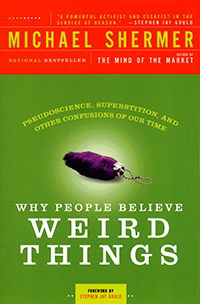
Why People Believe Weird Things by
Michael Shermer is a book full of skepticism as he talks about his
personal experiences with the world’s fascinations with the different types of
Pseudosciences. Because he is a skeptic, he investigates the popular pseudoscience theories out there that are things such as superstitions, conspiracy theories, and beliefs in the
paranormal phenomena. While doing this, he gives you an unbiased
opinion/analysis on the outcomes that he has experienced or knowledge he has
obtained divided into five topics/segments. Shermer debunks theories from UFO
sightings, alien abduction, holocaust denial, ritualized cults, & etc.
For
the first segment in the book, Shermer describes the meaning of skepticism. He promotes
everyone to have a healthy dose of skepticism when it comes to life when taking
in many things in life and speaks on the scientific method as the base for understanding
observed facts in life/nature. Since scientists rely heavily on self-correction
and duplicated proof in order to make their claims a fact. The process helps to
stimulate your mind to producing questions about everything / every aspect in
life.
In
the second section of the book, Shermer talks about the “Twenty-five Fallacies
that Lead Us to Believe Weird Things.” Since this segment focuses on paranormal
theories, he feels that people who strongly believe in miracles, monsters, and
mysteries are not crazy, but normal. However, he thinks that their normal
thinking has gone wrong in some way. He goes on to explain how people grasp on
to the beliefs that they can not prove and lack scientific evidence such as UFO
sightings, alien abductions, near death experiences, witch-hunts, and ESP are
examples of the difference between scientific fact and false belief. Lastly, he
links those beliefs to what he calls “cultural influences.” He stated, “Humans
are experiencing fantasies and interpreting them in the social context of their
age and culture.

In
the third segment, Shermer goes after religious creationism. He tries to prove
a point by bringing up multiple debates that he has had with a high-ranking believer
in creationism. He mentioned twenty-five different creationist claims that are
out there and attempted to debunk each one with the backing of his own research
findings and mentions the actual consequences that may occur based on a person’s
belief system.
The
fourth segment of the book talks about people who deny the Holocaust even
happening for a while. Shermer has found his own evidence of ideal reasons for
the deniers to refuse the scientific evidence that he has formed/found as a
counter argument. While this debate goes on with him and the Holocaust deniers,
he gets really person and shoots down their theories and comes off as
impassioned. This is due to him feeling very strongly on this topic.
In
the last segment, Shermer addresses how even the smartest individuals can psyche
themselves out to believe anything or things that are not true. He implies that
people gravitate towards believing in weird things because of the feeling of
excitement or rush that they feel when they believe it to be true.
I personally did not enjoy the book because in the beginning, I had the impression that he would speak on a more psychology level as to why people believe in weird things because of whatever cognitive reasoning. Instead of that happening I felt as if he just kind of took the fun out of some of the theories mentioned. After reading, I perceived the book was just about Shermer talking about debunking different beliefs.






No comments:
Post a Comment